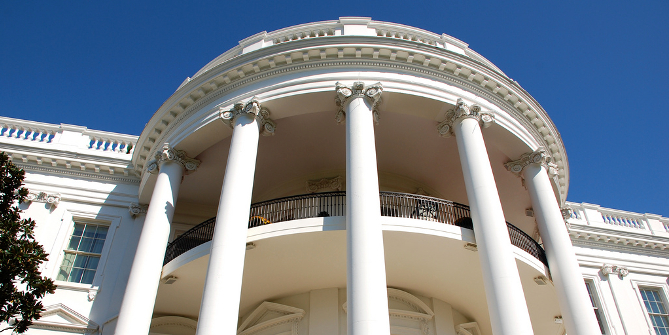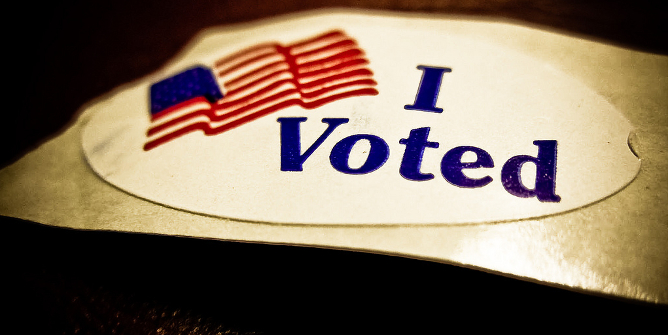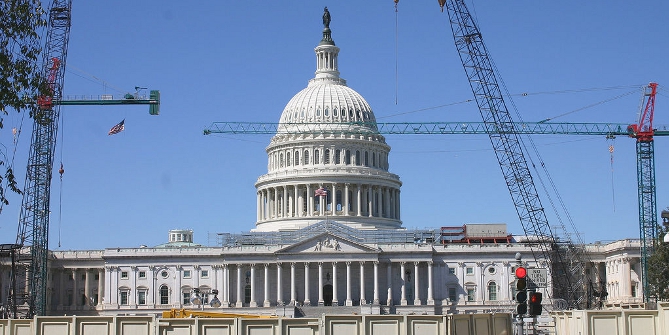 Many media post-mortems of the 2012 presidential race assume that the sluggish economy made Mitt Romney the favorite, but that President Obama prevailed due to a combination of his more likeable personality, a superior ground-game and an effective early advertising blitz, as well as Romney’s campaign mistakes. Implicitly, this narrative suggests that voters are easily swayed by media ads, candidate blandishments, and other campaign tactics, and that unexpected events, such as candidate gaffes, play a decisive role in electoral outcomes. Matthew Dickinson argues that Obama’s victory owes much more to the traditional fundamentals, particularly incumbency status and the economy, that usually determine the outcome of presidential elections.
Many media post-mortems of the 2012 presidential race assume that the sluggish economy made Mitt Romney the favorite, but that President Obama prevailed due to a combination of his more likeable personality, a superior ground-game and an effective early advertising blitz, as well as Romney’s campaign mistakes. Implicitly, this narrative suggests that voters are easily swayed by media ads, candidate blandishments, and other campaign tactics, and that unexpected events, such as candidate gaffes, play a decisive role in electoral outcomes. Matthew Dickinson argues that Obama’s victory owes much more to the traditional fundamentals, particularly incumbency status and the economy, that usually determine the outcome of presidential elections.
This article is part of a collaboration with the PS: Political Science and Politics symposium on US Presidential Election Forecasting. Click here to read other posts in this series.
Throughout the 2012 presidential campaign, political pundits openly wondered how Barack Obama maintained a consistent lead in the polls over his Republican rival Mitt Romney, despite a sluggish economy that should have doomed the incumbent. As Figure 1 shows, although Romney closed the polling gap after the first presidential debate in early October, he never led the incumbent president at any point in the aggregate polling compiled by Pollster.com throughout all of 2012.
Figure 1 – 2012 General election polling
 The explanation for Obama’s lead, many pundits concluded, was that voters were discounting the economic fundamentals that usually determine presidential elections in favor of other voting cues, such as candidate likeability, racial affinity and cultural identity. Moreover, Obama’s early advertising blitz in key swing states effectively defined his opponent as plutocrat out of touch with the concerns of middle-class Americans. Finally, many election post-mortems cited Obama’s superior ground game and Romney’s numerous campaign miscues as additional reasons why Obama won reelection despite the weak economy. No wonder some economic-based political science forecast models in 2012 were wrong – often spectacularly so!
The explanation for Obama’s lead, many pundits concluded, was that voters were discounting the economic fundamentals that usually determine presidential elections in favor of other voting cues, such as candidate likeability, racial affinity and cultural identity. Moreover, Obama’s early advertising blitz in key swing states effectively defined his opponent as plutocrat out of touch with the concerns of middle-class Americans. Finally, many election post-mortems cited Obama’s superior ground game and Romney’s numerous campaign miscues as additional reasons why Obama won reelection despite the weak economy. No wonder some economic-based political science forecast models in 2012 were wrong – often spectacularly so!
Implicitly, this conventional media narrative suggests that voters are easily swayed by campaign ads, candidate blandishments, and other election-year tactics, and that unexpected events, such as candidates’ gaffes, weigh more heavily than election fundamentals, such as state of the economy, in determining electoral outcomes. Fortunately for the reputation of both political science forecast models and for the American voter, the evidence supporting this media narrative is remarkably thin.
To begin, as a number of forecast models indicated, the economic fundamentals weren’t nearly as unfavorable to Obama’s chances as many pundits claimed. In early September 2012, Political Science and Politics posted 13 forecast models, shown in Figures 2 and 3 below, eight of which predicted an Obama victory and which in the aggregate had the President winning 50.2% of the two-party vote. In the end, Obama actually won 51.3% of that share.
Figure 2 – Political Science and Politics 2012 election National forecast models
Figure 3 – Political Science and Politics State 2012 election forecast models
To be sure, the models differ regarding what specific economic measures matter to voters. Some point to income growth, others to changes in GDP, and some utilize an index of economic indicators. The point, however, is that based on the economic fundamentals, most political scientists projected that, while the election would be close, Obama was likely a slight favorite.
One should not conclude from this, however, that campaigns do not matter. They do. But presidential candidates do not create campaign narratives out of whole cloth. Instead, they are constructed from the reality, such as the state of the economy, which matters most to voters. For an incumbent president like Obama, this usually means running a campaign focused on the fundamentals most favorable to him, be it the economy or keeping the nation secure. The challenger, in contrast, usually must shift the campaign narrative away from the incumbent’s preferred frame – a much more difficult task. All evidence indicates that Obama hewed closely to this script in 2012 by repeatedly emphasizing the poor economic conditions he inherited and suggesting that the economy was on the mend. That strategy left little maneuvering room for Romney who, rather than try an alternative campaign frame, decided instead to argue that the economy was not improving quickly enough. In the end, slightly more voters bought Obama’s frame. The key point, however, is that the economy, and not a new form of “identity” politics based in part on candidate qualities, was the major election issue – just as the forecast models anticipated. Indeed, exit polls show that fully 74% of respondents cited the economy (59%) or the deficit (15%) as the major campaign issue.
Similarly, while it may be true that Obama possessed a superior ground game, the evidence suggests that the marginal impact of that advantage, if any, was not big enough to change the outcome of the race. Indeed, overall turnout in 2012 was down from 2008, by 3.4%, as was Obama’s share of the vote, which dropped in that same period by 1.9%. Moreover, in five of the eight key battleground states, the drop off in Obama’s vote was greater than the decline in his overall national vote. In short, it is hard to prove that Obama won because his organization’s ground game outperformed Romney’s.
A similar story can be told about the relative impact of the two campaigns’ media strategies. Most research indicates that the impact of media ads on viewers decays rather rapidly. It is highly unlikely, therefore, that early media buys by the Obama campaign in key swing states were nearly as instrumental in defining Romney as pundits suggested. Indeed, with the exception of a post-convention polling bounce, one is hard pressed to find much variation in Obama’s polling support in the key battleground states throughout the campaign; for the most part, his numbers stayed relatively flat. In this vein, the “devastating” secret “47%” video recording appears to have had minimal effect on Romney’s polling support.
Finally, there’s not much historical evidence that differences in candidate “likability” have an impact on the presidential vote. In the 13 presidential elections from 1952-2000, Morris Fiorina finds the candidate with the net advantage in personal ratings won only seven times. It is true that Romney was viewed less favorably than Obama by most voters, but it is hard to disentangle favorability ratings from voters’ partisan leaning and their overall assessments of the fundamentals, including the state of the economy.
Contrary to the pundits’ postmortems, then, the outcome of the 2012 presidential race turned on the same factors, particularly the economic fundamentals, which political scientists have always cited as the keys to winning the presidency. Candidate strategy, including the media campaign, mattered but primarily as a means for both candidates to frame the economic fundamentals in ways most favorable to them. Perceptions of candidate qualities likely had a much smaller influence on the outcome than most pundits realize. The bottom line is that 2012 showed once again that it is very difficult to defeat an incumbent president in a time of economic growth – even weak growth.
This article is based on the paper “The 2012 Presidential Election: Taking the ‘Fun’ Out of Fundamentals?” appearing in the PS: Political Science and Politics symposium on US Presidential Election Forecasting. Click here to read the other posts in this series.
Featured Image Credit: Corey Seeman (Creative Commons: BY-NC-SA 2.0)
Please read our comments policy before commenting.
Note: This article gives the views of the author, and not the position of USApp– American Politics and Policy, nor of the London School of Economics.
Shortened URL for this post: http://bit.ly/QAjyub
_________________________________________
 Mathew J. Dickinson – Middlebury College
Mathew J. Dickinson – Middlebury College
Mathew J. Dickinson is professor of political science at Middlebury College. His blog on presidential power can be found at http://blogs.middlebury.edu/presidentialpower. He is author of Bitter Harvest: FDR, Presidential Power, and the Growth of the Presidential Branch (1999), the co-editor of Guardian of the Presidency: The Legacy of Richard E. Neustadt, and has published numerous articles on the presidency, Congress and the executive branch. His current book manuscript, titled The President and the White House Staff: People, Positions and Processes, 1945-2012, examines the growth of presidential staff in the post–World War II era.









1 Comments